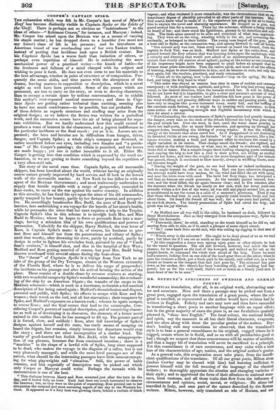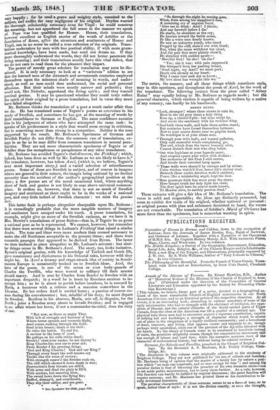MR. BETHUNE'S SPECIMENS OF SWEDISH AND GERMAN POETRY.
A rboETICAL translation, after all, is an original work, abstracting mat- ter and structure. Here and there a passage may be picked out from a great poet, engaged upon the translation of a great poem, where the ori- ginal is excelled, or represented as the author would have written had he written in English. Felicity and care may now and then have succeeded in transferring a short poem to another language with an equal effect; but in the great majority of cases the piece is, as our forefathers quaintly phrased it, "done into English." The local colour, the national feeling and spirit, nay the manners in all but their literal character, evaporate, and too often along with them the peculiar genius of the author. Dry- den's leading rule may sometimes be observed, that the translator's style is to bear a general resemblance to his original, rugged where he is ragged, ornate where he is florid, and so on with all peculiarities good or bad ; though we suspect that these concurrences will be matter of accident, and that a happy bit of translation will never be sacrificed to a principle. Yet this resemblance is of rare occurrence, and may exist with a total loss of the characteristics of age, nation, and the original author's genius.
As a general rule, this evaporation must take place, from the insuffi- cient qualifications of the translator. Of all our great poets, Milton alone (unless Cowley may be classed with him) had learning sufficient to possess himself with the full meaning of the language of the classical writers ; to thoroughly appreciate the niceties and changing varieties of their style; and to apprehend the force of their allusions to national man• ners, local customs, and all those traits that flow from the influence of circumstances and opinion, social, moral, or religious. He alone had travelled in Italy, and seen part of the nature described by the Roman writers. Milton, however, only translated an ode of Horace, and not
very happily ; for he used a grave and weighty style, unsuited to the subject, and unlike the easy negligence of his original. Dryden wanted the thorough scholarship necessary even for Virgil: he could construe the meaning, but not apprehend the full sense in the manner we speak oe Pope was less qualified for Homer. Hence, their translations, however excellent as English stories of the wrath of Achilles or the foundation of Rome, after the structure and sentiments of Homer and Virgil, can in no sense be called a true reflection of the originals. Trans- lations undertaken by men with less poetical ability, if with more gram- matical knowledge, have been made, but need not detain us. If they more thoroughly understood the words, they did not better penetrate the living meaning; and their translations mostly have this vital defect, that we do not care to read them for the pleasure they impart.
The power of merely great scholars for translation may soon be dis- missed. It is only necessary to look at a "variorum" edition to see that the learned men of the sixteenth and seventeenth centuries employed themselves upon the minutest shade of meaning in words, and under- stood, as well as men could then understand, the social and personal allusions. But their minds were mostly narrow and pedantic; they could not, like Niebuhr, apprehend the living spirit ; and they wanted poetical genius. It may be questioned whether they could truly reflect the spirit of their original by a prose translation, but in verse they must have failed altogether.
Mr. Bethune thinks the translation of a poet a much easier affair than we do. He has translated some of Tegner's poems as exercises in his study of Swedish, and sometimes he has got at the meaning of words by their resemblance to German or English. The same confidence sustains him in his judgment of others who have attempted the same task: he speaks of his predecessors in a style that would seem strong in criticism, but is something more than strong in a competitor. Neither is the tone supported by the result. Mr. Bethune's Specimens of German and Swedish Poetry do not differ from the common run of translations, ex- cept in as far as he may differ from common translators in mental pecu- liarities. They are not more characteristic specimens of Tegner or of Schiller than the metaphrases or paraphrases of any other translators.
Mr. Bethune has avoided Tegner's chef-d'oeuvre, the Frithiof; which, indeed, has been done as well by Mr. Latham as we are likely to have it.* The translator, however, has taken Axel, (which is, we believe, Tegner's next most important story,) and a varied selection of miscellaneous poems. Some of these are Swedish in subject, and of course in images; others are general in their nature, the images being national by no further necessity than the accident of the author's geographical position at the time ; a few poems are of the usual occasional kind, where anything short of luck and genius is not likely to soar above universal common- place. It strikes us, however, that there is not so much of Swedish imagery and sentiment as there ought to be in the works of a national poet, and very little indeed of Swedish character : we miss the genius loci.
This latter fault is perhaps altogether chargeable upon Mr. Bethune : it is exceedingly probable that the more tangible matters of imagery and sentiment have escaped under his touch. A prose translation, for example, might give us more of the Swedish raciness, as we have it in Mrs. Howitt's translations of prose fiction—that is, if Tegner be so great a national poet as he is represented. We cannot, however, but remember that there were several things in Latham's Frithiof that raised a similar doubt. The tone and ideas were more modern than seemed necessary to make the old Northmen acceptable to the present times ; and there were romantic passages that appeared to be derived from Byron. The latter we then inclined to place altogether to Mr. Latham's account : but simi- lar things occur in Mr. Bethune's Axel. The story, too, looks imitative. Byron's original genius, with his knowledge of Turkish and Greek life, gave consistency and distinctness to his Oriental tales, however wild they might be. In Axel a dreamy and stage-struck idea of society in South- eastern Europe is unnaturally hooked on to Swedish ideas. Axel, the hero of the poem, is one of the seven or nine body-guards of
Charles the Twelfth, who were vowed to celibacy till their master should marry. Axel is sent by Charles from Bender to Sweden with an important despatch; in a wood he is beset by Russians anxious to in-
tercept him ; as he is about to perish before numbers, he is rescued by Maria, a huntress with a retinue and a mansion somewhere in the
Ukraine. By her orders Axel is carried home ; a passion of course en- sues during his convalescence ; but, mindful of his duty, he must depart for Sweden. Restless in his absence, Maria, sets off, in disguise, for the
North ; joins a Russian army about to invade Sweden ; and is engaged in an affair where her lover, if not a commander-in-chief, does the duty of one.
"But now, as fierce as angry Thor,
With belt of strength and hammer of war, Where terror spreads and counsels flight, Axel comes rushing through the fight.
Steel is his breast; death is his blow: He rules the battle. To and fro, A saviour in the hour of need, Hegallops on his milk-white steed: Swedes! close your ranks; be not dismay'd; King Charles has sent me to your aid; From Bender I his greeting bring; 'God and King Charles! God and our King I'
Through every heart the well-known cry
Thrills like the voice of victory: With strength renew'd the Swedes rush on, The cliff which shower'd down death is won; Destruction's fiery throats are still'd, With arms and dead the plain is filfd. With aimless, but uuerring blow, The sword hews down the flying foe; Baked, dismay'd, and overthrown,
They slip their cables, and are gone.
• • See Spectator for 1838, page 638. "So through the night he musing goes, When, from among his slaughter'd foes,
A mourning cry of anguish burst,
' Give ins to drink: Axel! I thirst;
And say farewell before I die.'
He starts, he shudders at the cry; He hurries toward the feeble moan, So like a voice once dearly known. He saw an unknown youth, who stood
Propp'd by the cliff, stain'd o'er with blood; But, when the moon withdrew her cloud,
And the pale face more plainly show'd, He shrieked with sudden agony-
' Merciful God! 'tis she! 'tis she!'
"Yes; she it was: with pain suppress'd
She whisper'd from her panting breast, 'Good night, my Axel! we must part; Death sits already at my heart: Why I came here seek not to know; My love alone has wrought this wo. '"
The metre, the manner, and all those things which constitute styles may in this specimen, and throughout the poem of Axel, be the work of
the translator. The following extract from the piece called "Abbey
Rains " may equally belong to Mr. Bethune as regards mode; but the general character, which renders it capable of being written by a native of any country, can hardly be his handiwork.
ABBEY RUINS.
"Look, stranger ! where these stones in rain lie, Here in the old grey times a holy thing
Rose np, a cloister'd pile: bat time swept by, And smote the sanctuary with his reckless wing.
"Zeal built these walls, and bade these arches stand;
But centuries have forced themselves between: Now to your courts draws near no pilgrim band, No worshiper is at your altars seen.
"Through your wide halls, and wasted galleries, Only cold mournful winds complaining go; The owl, which from the turret hoarsely cries,
Cannot disturb their rest who sleep below.
"Our wise logicians at your legends sneer,
And sceptics spurn your relics with disdain: The memories of the Past I still revere, And kindle their corroded lamp again.
"These walls were ahunn'd by outrage and by crime; Calm wisdom watch'd from hence life's stormy roar; Beneath these vaults devotion walk'd sublime; Peace, like a ministering angel, kept the door.
"Here prostrate faith has worn away the stone;
Here Gospel truth her holy light has shed; The fiery spirit here its source made known, To Heaven alive, to earthly passion dead."
These extracts will give a fair idea of Mr. Bethune's translation. The verse is solid and respectable; theAdeas to distinctly presented, but seem to exhibit few traits of his original, whither national or personal: as original poems with plan and substance furnished to hand, the verses
are not remarkable. The translation of Schiller's Maid of Orleans has
more force than the specimens, but is somewhat wanting in spirit.



























 Previous page
Previous page